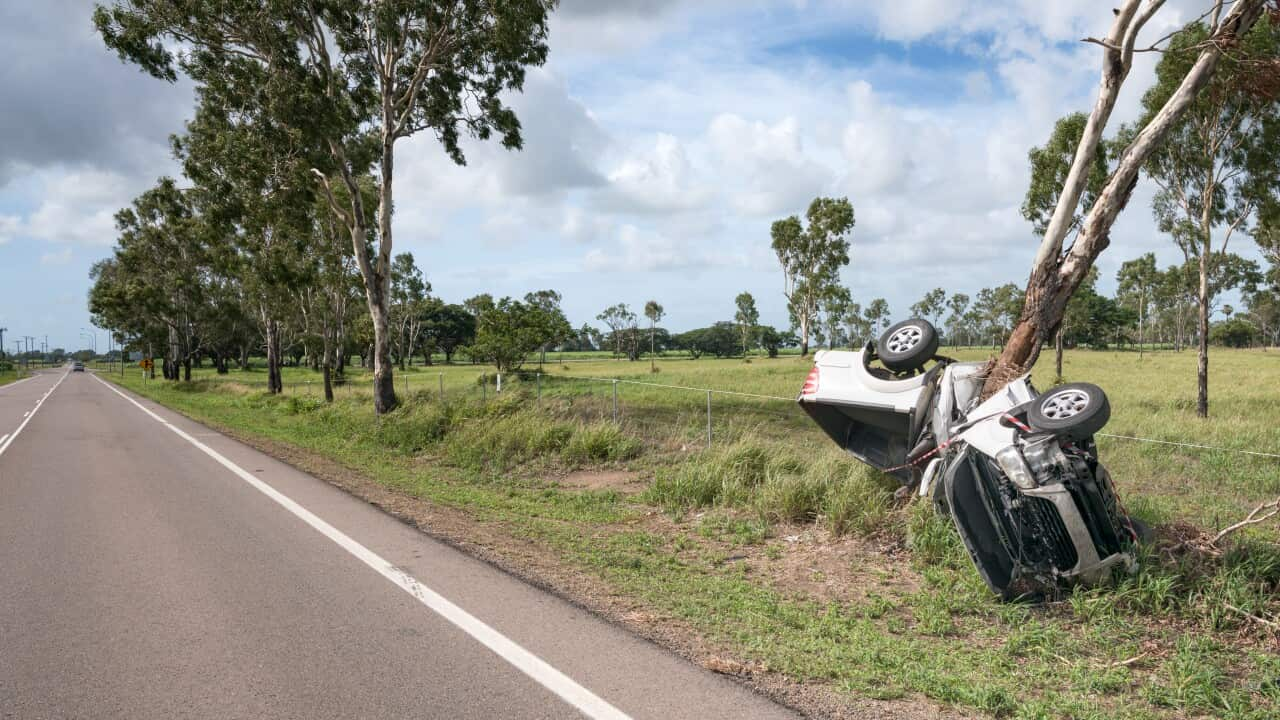Key Points
- Australia has one of the lowest rates of first aid training in the world.
- Advocates call for compulsory first aid training for learner drivers.
- European countries like Germany and Switzerland incorporate first aid courses into driver learning programs.
When Greg Finlay became the first responder after a severe car accident on a rural Queensland road, his first aid training quickly kicked in.
"At first, I tried hard to stay focused, but I could not remember triple zero — that's how shocked I was. Luckily, I did remember DRABC from my training," he told SBS German.
Eventually, Finlay managed to call emergency services. However, the ambulance was 50 minutes away because the accident occurred so remotely.
"Although there were five ambulances in the region, I was at the furthest distance of each."
Finlay said his first-aid training gave him the confidence to step forward and take the necessary action until further help arrived.
"Out here remotely, it is a long time to get help, so if you come across a road accident, you really have to know what to do," Finlay said.
"To this day, I don't know how the gentleman survived the crash, but I'm sure the first aid contributed to that."
Advocates call for compulsory first aid training in Australia
Every eight hours, someone is killed in an accident on Australian roads, while someone is seriously injured every 15 minutes.
Last year's death toll of 1,200 was the highest in more than five years.
However, according to the Australian Red Cross, fewer than 5 per cent of the population is trained in first aid—one of the lowest numbers in the world.
Valmai Dempsey has been actively advocating for this issue nearly her whole life.
"I have aimed to change that for the last 30-odd years. I believe every person on the road should have first aid knowledge, which should be a mandatory part of achieving your driver's licence," Dempsey said.

Valmai Dempsey is the 2022 Senior Australian of the Year. Source: AAP
Late last year, the ACT government launched a program that allows learner drivers the opportunity to obtain basic lifesaving first aid skills and claim five hours of credit against their required driving hours.
Advocates say such moves can go even further, citing compulsory first aid initiatives in several European countries.
"I'd like it to go one step further, requiring them to have a first aid certificate when they get their driving permit," Dempsey said.
Last year, St John Ambulance launched a petition directed at the Queensland government, calling for mandatory first aid training for individuals obtaining driver’s licences in the state.
According to a spokesperson, the Department of Transport and Main Roads met with St John Ambulance to discuss its proposal and how first aid training in the state may be most effectively promoted.
"Any move to add first aid training as a driver licence pre-requisite needs to be carefully considered and balanced against the need to ensure drive licences continue to be accessible and affordable,” the spokesperson said.
Europe is leading in first aid certifications
For years, many European countries have required learner drivers show first-aid knowledge for their theory tests.
In Switzerland, learner drivers must attend a 10-hour first aid course. In Germany, first-aid is taught in nine 45-minute sessions, including practical and theoretical knowledge in case of a road accident.
According to a 2021 survey by ADAC, Europe's largest automobile association, one in every four adults in Germany has had first-aid training in the last five years.
However, despite the World Health Organization stressing the importance of teaching drivers first aid to prevent deaths and reduce injuries from accidents, none of the Australian states or territories have made it a part of their licensing requirements.

It is compulsory in Germany to carry a first aid kit on-board all vehicles. Source: Getty / Westend61-Getty
Lifesaving legislation
Mathias Burbach ran first-aid courses at the Red Cross in Germany before moving to Australia.
Since then, he has volunteered for the Australian counterpart and is convinced that the legislation of his home country would benefit the safety of drivers.
According to Burbach, it is also crucial to carry a first aid kit in your vehicle at all times, another compulsory requirement in Germany.
"Laws like that do not exist in Australia, making it difficult to help professionally in the case of an accident. Especially in remote areas of Australia, that is a problem," Burbach said.
"Once oxygen is cut off, the brain starts to suffer damage within four to five minutes. That's why having trained first aiders on site to maintain blood circulation until the ambulance arrives can significantly lower the chances of brain damage, lessening the lasting impact of serious injuries."

Since the introduction of mandatory seat belts in 1970, Australia has experienced a consistent decrease in road fatalities.
"As a first world country, we made so many inroads when it comes to safe lives, like compulsory seat belts, just to name one. I do think it should be mandatory after my experience," he said.
A survey from St John Ambulance late last year found that nearly four in five Australians believe people should be equipped with first aid training as a requirement of holding a driver’s licence.




